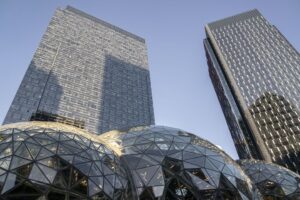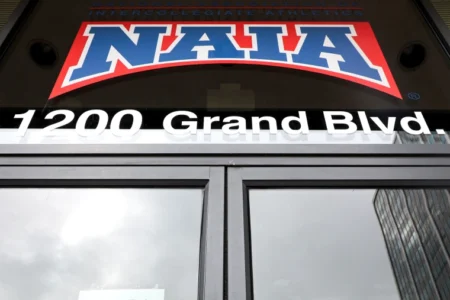Bears President and CEO Ted Phillips said in a statement that finalizing the agreement was the “critical next step in continuing our exploration of the property and its potential.” Churchill Downs announced the sale price was $197.2 million and said it anticipated closing the sale in late 2022 or early 2023.
Soldier Field, which is owned by the Chicago Park District, holds 61,500 fans, the smallest capacity in the NFL. The Bears also would be able to develop the 326-acre property around the stadium with shopping, dining and entertainment.
Here’s what to know about the possible move from Soldier Field, with reaction from City Hall to Arlington Heights.
With its views of Chicago’s skyline and games enhanced by wind-driven snow, the 97-year-old stadium is as much a part of the Bears identity as tenacious linebackers or underperforming quarterbacks. The team’s allegiance to the lakefront shrine has long been a point of civic pride, giving fans something to brag about even when — especially when — they couldn’t brag about the squad itself.
Yet, seemingly, the storied site can no longer compete with the so-called fan experience marketed by other teams.
Fans, however, were exponentially more understanding and some even expressed a draft day-like optimism that better days are ahead. With a tentative deal unlikely to close before late 2022, they dreamed openly of shorter concessions, easier parking, better tailgating opportunities and a domed stadium that protected them from biting winter winds.
Mayor Lori Lightfoot, center, attends pregame ceremonies before a game between the Bears and Vikings at Soldier Field on Sept. 29, 2019. (John J. Kim / Chicago Tribune)
Die-hard Chicago Bears fan Mayor Lori Lightfoot must be sympathizing with rookie quarterback Justin Fields’ tough day in Cleveland: flee Browns defensive lineman Myles Garrett, only to get knocked to the ground — again — by linebacker Jadeveon Clowney.
The mayor faces a similarly intimidating set of obstacles in her bid to keep the Bears from decamping to Arlington Heights: Come up with a miracle and billions of dollars in taxpayer money to convince them to stay, further hamstringing the city’s finances. Or go down in history as the mayor who lost a charter member of the National Football League to the suburbs.
The McCaskey family that owns the Bears has been tight-lipped about its pursuit of a new home, and the Bears remain a private business enterprise, which leaves many of the questions about how the team might finance a potentially multibillion dollar stadium unanswered for now.
What is more clear is the potential cost to the city of Chicago if its marquee tenant for Soldier Field leaves, and how much the Bears might have to pony up to break their lease with the city.

Bears fans arrive for a game against the Bengals at Soldier Field on Sept. 19, 2021. (Chris Sweda / Chicago Tribune)
News of the Chicago Bears’ purchase of the Arlington Heights Racecourse property proves they’re serious about leaving Soldier Field. The sooner, the better, writes Paul Sullivan.
Wrigley Field served as the original home venue for the team when it moved to Chicago in 1921 and remained there through 1970. The team won nearly 70% of its home games during that span.
But the Bears were forced to find a new home after the American Football League merged with the National Football League and required stadiums to seat at least 50,000 fans. The team played its last game at Wrigley Field on Dec. 13, 1970, beating the Packers 35-17.

The view of Arlington International Racecourse on June 24, 2021. (Erin Hooley / Chicago Tribune)
Hotels, restaurants, bars and other entertainment are natural fits around a football stadium, said Jason Wurtz, executive vice president at commercial real estate firm NAI Hiffman. But the size of the property means it’s likely too big for just one use, and there have to be enough people around to patronize businesses during off days and the off season, he said.

Mayor Lori Lightfoot and Gov. J.B. Pritzker listen to speakers outside the United Center mass vaccination site on March, 9, 2021. (Antonio Perez / Chicago Tribune)
Gov. J.B. Pritzker said Thursday that it’s up to Mayor Lori Lightfoot and leaders in northwest suburban Arlington Heights to determine whether local taxpayers should help pay to build a new stadium for the Chicago Bears.
Pritzker did not unequivocally rule out state subsidies for a new stadium, but said no one from the football team had approached him.

People cross the Metra tracks in downtown Arlington Heights on Sept. 29, 2021. (Brian Cassella / Chicago Tribune)
Just days after a farewell fireworks display marked the end of a storied era of thoroughbred horse racing in Arlington Heights, residents woke up Wednesday to the news that the Chicago Bears in a few years could be making the northwest suburb their home.
The move by the Bears is not a done deal. And some in the village might not want to get their hopes too high. About 50 years ago, the Bears floated the idea of moving there.

A view of Soldier Field, home of the Bears, with the Chicago skyline on Sept. 29, 2021. (Jose M. Osorio / Chicago Tribune)
A possible state role in the Bears’ potential move from the lakefront to the northwest suburbs has yet to be formally discussed, but any request from the team for financial assistance would likely prove a tough sell as Illinois emerges from the coronavirus pandemic and continues to grapple with chronic fiscal ills.
Democratic state Rep. Kam Buckner, a former University of Illinois football player whose district is home to Soldier Field, called Wednesday’s announcement “extremely disheartening.”
After almost a century of thoroughbred racing, Arlington International Racecourse in Arlington Heights closed its gates to the sport Saturday for the final time – and the future of the venue remains uncertain.
Racetrack fans, staff and even jockeys collectively agreed it was a sad day at Arlington Park. Horses ran the final turn, fans donned their fancy hats and placed their final bets while staff faced an uncertain future. Many shared the memories of family fun and spectacular fireworks, sunny Saturday afternoons with friends winning big or losing, and the grandeur of a racetrack unlike any other.






